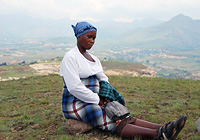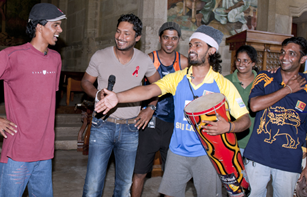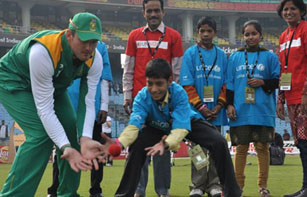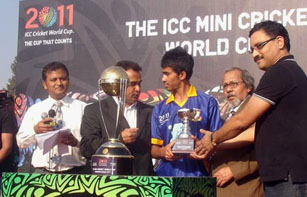A version of this story was first published at unicef.org

Malekena George heads home from the Pilot Health Clinic in Lesotho’s Berea district after her first antenatal check-up
Credit: © UNICEF Lesotho/2010
Malekena George, from Lesotho’s Berea district, is eight months pregnant, living with HIV, and exhausted from the five-hour trek she endured to get to the Pilot Health Clinic, for her first antenatal check-up. But because her journey to the clinic was so difficult, this visit may also be her last.
Ms. George's first child died at 13 months, and the Lesotho Ministry of Health is working to ensure that her second baby is not born with HIV.
In 2007, the Government, with help from UNICEF and other partners, initiated a massive effort to improve the country's Prevention of Mother-to-Child HIV Transmission (PMTCT) services. To succeed, they needed to ensure that every clinic in the country could provide HIV testing and treatment.
Lesotho leads the way
Lesotho became one of the first countries in the region to allow nurses to administer antiretroviral (ARV) treatments, which greatly expanded access to these critical interventions in the remote areas of the country where fewer doctors are available.

Malekena George is given her new ‘Mother to Baby Pack’ at the Pilot Health Clinic. The pack includes ARV drugs and antibiotics
Credit: © UNICEF Lesotho/2010
But despite such efforts, major challenges remain, including the fact that many women, like Ms. George, are likely to make only one clinic visit.
This is a typical problem for many health systems in Africa. Though ARV drugs substantially increase the chances that a baby is born free of the virus, providing HIV-positive mothers with the treatment is not easy, especially in remote areas. The combination of distance, lack of transport and poverty prevents many women from making regular antenatal care visits. Such factors also lead many women to drop out of the PMTCT programmes, and to deliver their babies at home without the presence of trained medical professionals.
In a country such as Lesotho, where one in four people is living with HIV, that one antenatal visit has become all the more critical.
Keeping mother and child healthy
Innovative prevention methods are making a huge difference. The Lesotho Government has designed a minimum package for expectant mothers like Ms. George that includes the most effective ARV drugs and antibiotics needed to keep them, and their children, healthy. When they leave the clinic, women are also provided with clear instructions on what medicines they need to take – and when – and what medicines they need to give to their babies after birth.
In an effort to expand this public health innovation ever further, UNICEF and WHO have created a colour-coded take-home box that will be rolled out to five countries in eastern and southern Africa, Lesotho included, by July. Instead of the nurses having to pack all the medicines in small pill bags, this new 'Mother to Baby Pack' clearly separates the ARV drugs and the antibiotics according to when they need to be taken.
"We had to take advantage of the first antenatal visit," said UNICEF HIV and Maternal Health Expert Blandinah Motaung. "In case a woman delivers at home, she will have that package with her."
A dramatic drop in infections
With the new regimen of ARV treatments, and the efforts to facilitate women taking these medicines at home, health experts expect the number of babies born with HIV in Lesotho to drop dramatically.
"The expectation is that with better adherence to treatment and more focus on helping mothers to exclusively breastfeed for six months, we can further reduce the transmission rate to less than five per cent," said Ms. Motaung.
Take home medicine
After her check-up, Ms. George listened carefully to Marethabile Lelia, the clinic nurse, give instructions on the medicines that she would be carrying home. The mother-to-mother counsellor reiterated the importance of sticking to the treatment.
Although Ms. George has another appointment scheduled at the clinic, Ms. Lelia doesn't expect to see her until she returns with a six-week-old for the baby's first round of immunizations and first HIV test - children are again tested at 12, and then 18 months
As she prepared for her five-hour walk home, Ms. George clung to her medicines, understanding clearly that they represented her best hope of ensuring that her baby would escape HIV infection and grow up healthy
Lesotho has the third highest adult HIV prevalence in the world at 23.2%. There are an estimated 270,273 people living with HIV in Lesotho as of end 2007 of which 258,472 are adults and 11.801 children. At the end of 2007, an estimated 3,966 pregnant women with HIV received anti-retroviral treatment to prevent mother to child transmission (PMTCT) of HIV. The coverage of PMTCT programmes has increased from an estimated 5% in 2005 to 42% in the first quarter 2009












 Malekena George is given her new ‘Mother to Baby Pack’ at the Pilot Health Clinic. The pack includes ARV drugs and antibiotics
Malekena George is given her new ‘Mother to Baby Pack’ at the Pilot Health Clinic. The pack includes ARV drugs and antibiotics